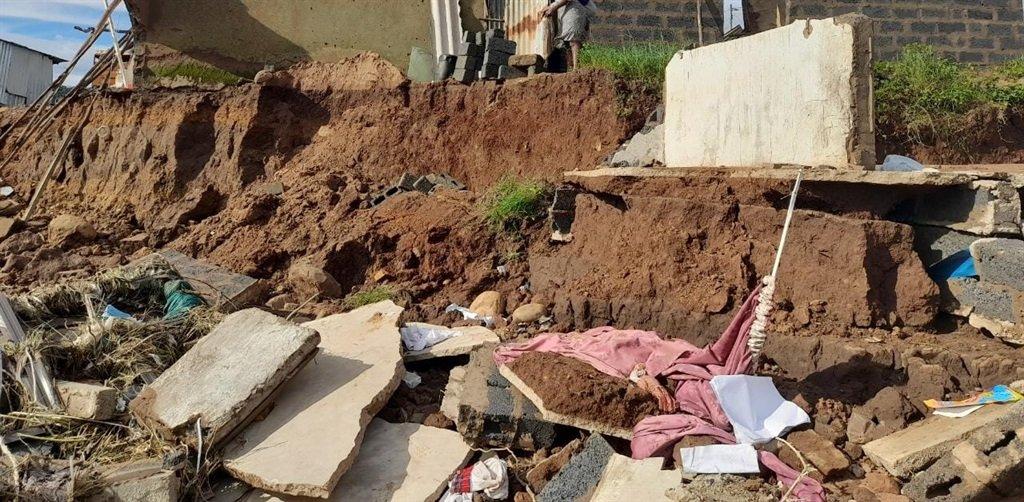Africa-Press – South-Africa. In the immediate aftermath of the floods in KwaZulu-Natal, we’ll want to know who is to blame. Well its not nature, writes Dewald van Niekerk.
The recent floods in KwaZulu-Natal are a stark reminder that humans and nature are intertwined.
The devastation of the past week has not been seen in the modern history of South Africa. The images of houses, cars, infrastructure, and people being swept away left our nation in shock.
Once the water subsides, the damage will be in the billions of Rand, and the long-term toll on livelihoods, the economy and development even more. It will place a disproportionate strain on all our systems, especially in an economy struggling to come to terms with the Covid-19 pandemic. In this immediate aftermath, we want to know who is to blame.
Climate change is widely cited for influencing weather patterns and exacerbating the frequency and intensity of hydro- and meteorological hazards. There is enough scientific evidence that supports this argument. The recent IPCC Six Assessment Report reiterates that, which we have known for years – climate impacts are on the rise, and we are reaching (or have reached) a no-return tipping point.
IN-DEPTH: ‘Not normal’ – Experts unpack what may have caused the devastating flooding in KwaZulu-Natal
Looking at the SADC region over the past 10 years gives us a clear indication of how severe weather phenomena have become. However, it could be ignorant to blame climate change solely.
Others would like us to believe that this is an “Act of God” – that some deity is expressing his or her dislike with us and that our actions need retribution. As one News24 user comically remarked: “It is God showing his dissatisfaction with the election of Gumede” (referring to the recent election of criminally accused Zandile Gumede as eThekwini’s regional ANC chair).
Our president, as well as the KZN premier, calls this “a force of nature” and a “natural disaster”. Opposition parties, like the EFF, have likewise called this a natural disaster, however, have emphasised that the impact of lives and livelihoods can be managed.
This narrative that nature is to blame is not new, and certainly not correct.
Blaming nature is a convenient way of absconding any responsibility. Such a belief shows a very narrow understanding of how disasters and disaster risks are created, and it leaves us powerless in the face of increasing natural phenomena.
Flooding in KZN is an annual occurence
Flooding, and the subsequent loss of lives and property in KZN is also not something new, and has become an annual occurrence. Yet, we need to ask the question why this is so?
In answering this question, we need to look beyond the natural hazards we face and understand the underlying risk drivers, exposure of people and infrastructure, and vulnerability. Decades of research into disasters and risks by the academic fraternity clearly shows that in most, if not all, cases it is these underlying risk drivers which are to blame. And all these drivers are within the control of human beings.
As these floods once again shown, it is primarily the poorest of the poor who are disproportionately affected.
Qaanitah Hunter: Sorry Durban, the ANC has failed you again (and again)
The South African government and the KZN province has failed in its obligation to ensure a healthy and secure environment for all our people as promised in the Constitution. The government has failed in implementing and monitoring its own development and disaster management laws and policies.
Unemployment, poverty, inequality, corruption, uncontrollable urbanisation, poor urban planning and haphazard development, inadequate robust public infrastructure, little to no maintenance of infrastructure, questionable housing construction and enforcing of building codes, absence of disaster risk reduction, settling on marginal land including slopes (because people have no other choice), destroying wetland and estuaries, removing vegetation in landslide prone areas, poor disaster preparedness, are some of these underlying drivers and risk creators.
Vulnerable and poor exposed
In turn, they expose the most vulnerable and poor to the wrath of natural hazards. Combine the above in a dysfunctional province rife with petty party politics and internal factional fighting, and the human cause of this disaster is abundantly clear.
However, one should not expect any accountability on the side of the eThekwini municipality, the KZN province nor our national government. They would like us to believe this is a “natural disaster” over which we have no control, and the declaration of a provincial state of disaster will now solve all our problems.
Until there is a realisation and acknowledgement that we are the creators of disaster risk and that disasters are the making of human beings, we will continue to see disasters of this magnitude (and even worse) for years to come.
Winston Churchill famously proclaimed that one should never let a good crisis go to waste. His comments assume positive change and renewal.
The Covid-19 pandemic has shown us that the government is incapable of capitalising on a “good crisis” for the greater good. With enough media reporting and civil society pressure, we, the electorate, can use this crisis for the greater good of society and in doing so ensure a more just and accountable governance system. Disasters are not natural.
– Dewald van Niekerk is a professor in geography and the director of the African Centre for Disaster Studies at the North-West University.
To receive Opinions Weekly, sign up for the newsletter here
.
*Want to respond to the columnist? Send your letter or article to [email protected]
with your name and town or province. You are welcome to also send a profile picture. We encourage a diversity of voices and views in our readers’ submissions and reserve the right not to publish any and all submissions received.
For More News And Analysis About South-Africa Follow Africa-Press






